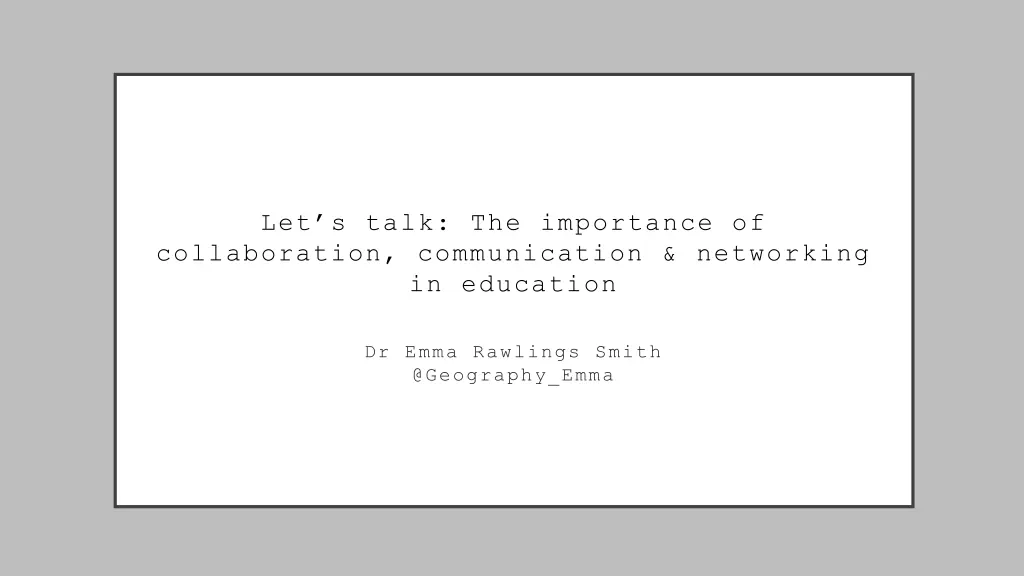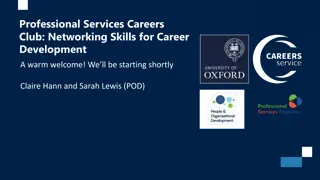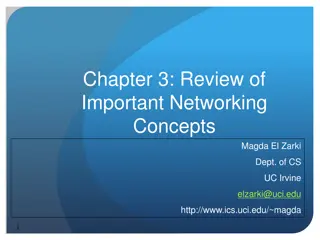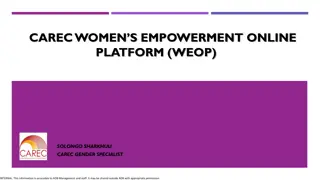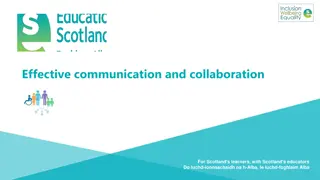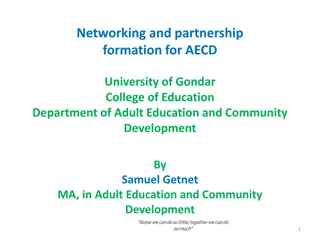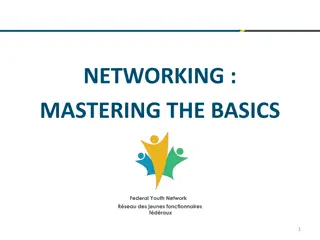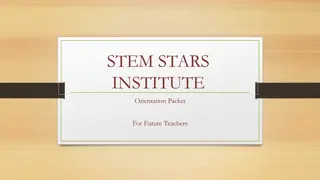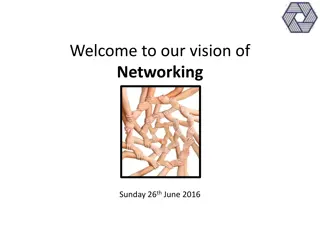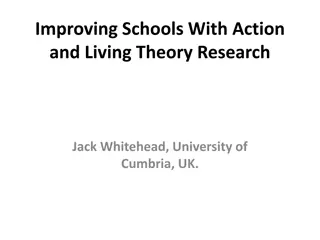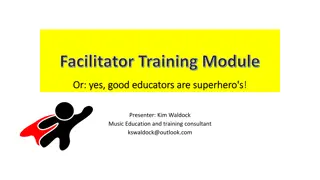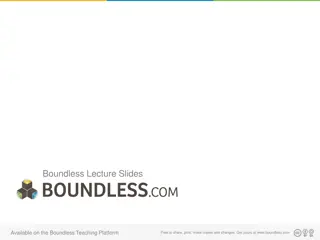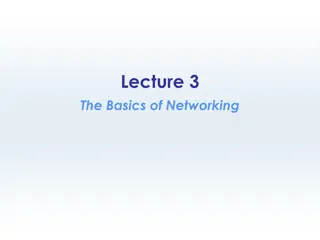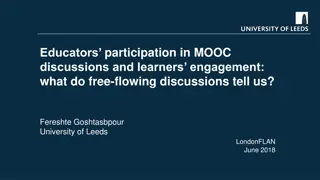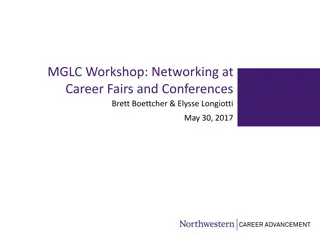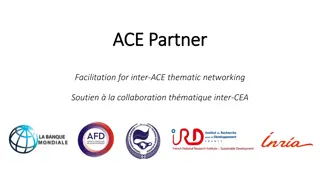Empowering Educators: Collaboration, Communication, Networking
Explore the importance of collaboration, communication, and networking in education for teacher knowledge and professional growth. Discover the role of professional learning communities and how they impact teaching practices. Gain insights from research findings and recommendations to enhance educator development.
Download Presentation

Please find below an Image/Link to download the presentation.
The content on the website is provided AS IS for your information and personal use only. It may not be sold, licensed, or shared on other websites without obtaining consent from the author. Download presentation by click this link. If you encounter any issues during the download, it is possible that the publisher has removed the file from their server.
E N D
Presentation Transcript
Lets talk: The importance of collaboration, communication & networking in education Dr Emma Rawlings Smith @Geography_Emma
Overview Context: Initial teacher education what is it for? What knowledge is needed for teaching in schools? What is professional teacher knowledge? The role of professional learning communities A small-scale case-study project Research findings and recommendations
Context: What is Initial Teacher Education for? ITE provides: Professional learning in preparation for a teaching career Structured reflective practice Navigation of the theory- practice relationship Access to experts: academic & professional Space to develop a professional identity Awareness of formal & informal learning Induction into communities of practice Professional work is esoteric, complex and discretionary, requiring theoretical knowledge, skill and judgement Hoyle & John (1995)
What knowledge is needed for teaching in schools? Geography knowledge knowledge Knowing what to teach Pedagogical content Knowing how to teach Knowledge of: Representations of the subject Purpose of education General pedagogy School context Pupils pre- and mis- conceptions of the subject (Shulman, 1986) Disciplinary knowledge i.e. epistemic understanding of how knowledge is constructed & validated Formal knowledge i.e. education policy: NC & specs & endorsed textbooks School substantive knowledge i.e. propositional, procedural & everyday knowledge Enacted knowledge curriculum, pedagogy and assessment in the classroom with a particular class
What is teachers professional knowledge? Three interconnected aspects of teachers professional knowledge: Practical wisdom Technical knowledge Critical reflection (Winch et al., 2014) The teacher as professional is central to this BERA (2014) model, and suggests teachers have the capacity to integrate knowledge from different sources, and apply and adopt in practice. BERA, 2014
Communities of practice & professional learning communities collective Communities of Practice (CoP; Lave & Wenger, 1991) are characterised by: Mutual engagement: shared activities Joint enterprise: practice shaped by negotiation Shared repertoire: culture & resources develop collegia l personal Professional Learning Communities (Bolam et al., 2005; Stoll et al. 2006) are: Professional as activities focus on improving classroom practice and therefore student outcomes Learning by assuming knowledge resides among professionals and their everyday practice Leat et al. (2015)
A small-scale case study project This small-scale case study research project aims to explore how PGCE geography students develop collaborative practices and benefit from being connected with other teachers and academics. Four research questions: 1. Which communities of practice do beginning geography teachers belong to? 2. Who influences beginning teachers' thinking about teaching and learning school geography and how does this change with experience? 3. How do interactions with academics, geography educators, teachers and peers benefit beginning teachers' classroom practice? 4. How do beginning teachers plan to further develop subject knowledge and skills? Sample n=70 PGCE students from 4 institutions
1. Who do preservice teachers connect with to inform classroom practice? Research findings Collegial Peer-support (25 to 58) Placement department (23 to 46) Collective Twitter (28 to 53) University geography dept. (21 to 27) University education dept. (15 to 19) Field Studies Council (20 to 21) Geographical Association (37 to 44) Royal Geographical Society (39 to 41) 58 53 46 45 PGCE students 42 29 27 27 21 19 19 15
2. Who influences PGCE students thinking about teaching and learning school geography? University tutors (26/70) Valued for: passion wealth of knowledge & expertise support for professional development guidance on theory & reflective practice Research findings School mentors (40/70) Valued for: personal or affective qualities professional competences/cognitive qualities professional collaboration/ sociality mutual dialogue This is due to the subject mentor deciding my results for the placement. Therefore my practice is tailored to meet their demands Websites for teachers TES (35/70) Teachit Geography (14/70) BBC Bitesize (8/70) GA (8/70) Twitter (5/70) Peers (26/70) Valued for: shared experience, shared support ideas and resources to try
2. Which sources of knowledge influence PGCE students thinking about school geography? Research findings Geography/Education academics CPD for teachers Ambassadors in schools Wider participation Taster days/student lectures Masters, EdD, PhD MOOCs Research involvement ESRI Field Studies Council Met Office Digimaps CND Peace Education UK Parliament Geography consultants Observing Mentoring Coaching Co-teaching Co-planning Collaboration Action research Academic texts Formal i.e. textbooks Popular Fiction Non-fiction Books Journals Universities School Colleagues Professionals Networks School-led CPD INSET Sessions SENDCO advice T&L support Professional reviews Practitioner research NPQs/Accreditation Behind Paywall: Empirical Theoretical Professional Popular Open Access journals Magazines RGS (with IBG) GA branches & committees AQA, OCR, Edexcel, Pearson IGU-CGE PiXL Chartered College NASBTT, MATS, LAs BERA, BELMAS Local school networks Twitter, FB, What s App groups
3. How do interactions with others benefit beginning teachers' classroom practice? Research findings Collaboration can be powerful with peers: Collaboration with other PGCE students to create resources and lesson plans for a scheme of work. I found this best as we are direct peers without a power hierarchy Microteaching - watching everyone's lesson created a collaborative learning environment which helped develop both subject knowledge and teaching techniques I have shared resources with my fellow PGCE students and discussed what we have found work well Collaborative can be powerful with other teachers: Planning a lesson for both me and my subject mentor to teach separately so we planned it together and I observed her teach it first
4. How do beginning teachers intend to further develop subject knowledge and skills? Research findings Have you kept in touch with your university geography dept? 26/70 Activities to further develop subject knowledge: Read books - 17/70 Get involved with CPD - 14/70 Attend GA Conference -13/70 Read journals -11/70 Observe outstanding teachers - 9/70 Keep up with current affairs - 9/70 Attend lectures - 8/70 Less frequently mentioned activities: joining the GA, connecting with others via social media, reading textbooks, learning on the job, researching and examining.
Policy recommendations The Standard for Teachers Professional Development (TPD; DfE, 2016) states that effective TPD should: Have a focus on improving and evaluating pupil outcomes Be underpinned by robust evidence and expertise Include collaboration and expert challenge Be sustained over time The 2016 Education White Paper sets out 5-year plans for reforms which includes extending probation for ECTs to two years. UCET s (2021) Discussion Paper notes that CPD should seek to: Develop teachers as competent, confident and responsible professionals Be context specific; supported by learned societies Not narrowly focused on pupil attainment, but deepen educators learning Support educators as epistemic agents and critical, reflective practitioners
Recommendations: types of knowledge If we want to continually developing teachers, we need to be explicit about the type of knowledge we, as professionals, want to develop and where best to source this knowledge. abstract knowledge knowing that generic knowledge academic knowledge less skill/ ability knowing how more skill/ ability knowing how Everyday/ practical knowledge Professional/ vocational knowledge concrete knowledge knowing that (Maton 2014)
Recommendations: collaboration Teacher educators working in universities, colleges and schools can support new teachers with expansive workplace learning environments: Personal Collaborative not isolated working Collegial Mutually supportive colleagues Explicit focus on teacher learning as part of practice Supported opportunities for PD beyond institutional or government priorities Collective Out-of-institution educational opportunities i.e. GA Opportunities to integrate professional learning into everyday practice i.e. professional awards - CGeog Opportunities to work across collective collegial personal Leat et al. (2015)
Recommendations: collaborative professionalism To conclude, if we want to take CPD seriously, then we could pay attention to Hargreaves & O Connor (2018) ten tenets of Collaborative professionalism when planning CPD. Findings from this research show that PGCE students value: Mutual dialogue - when treated as a full member of a geography department. Joint work when power hierarchies are removed and they co-plan lessons or observe a lesson that they planned being taught. Common meaning and purpose when CPD is authentic and occurs in the workplace.
Reading British Educational Research Association (BERA; 2014) Research and the Teaching Profession: Building the capacity for a self- improving education system. Final report of the BERA-RSA inquiry into the role of research in teacher education. London: BERA- RSA. Available at: www.bera.ac.uk/wp-content/uploads/2013/12/BERA-RSA-Research-Teaching-Profession-FULL- REPORT-for- web.pdf Bolam, R, McMahon, A, Stoll, L, Thomas, S and Wallace, M (2005) Creating and Sustaining Professional Learning Communities. Available at: dera.ioe.ac.uk/5622/1/RR637.pdf Hodkinson, H and Hodkinson, P (2005) Improving schoolteachers workplace learning , Research Papers in Education, 20 (2),109- 131. Available at: doi.org/10.1080/02671520500077921 Hoyle, E., & John, PD. (1995) Professional knowledge and professional practice. Cassell Illeris, K. (2004) Transformative Learning in the Perspective of a Comprehensive Learning Theory,, Journal of Transformative Education, 2(2), 79-89. https://doi.org/10.1177/1541344603262315 Maton, K. (2014) Knowledge and Knowers: Towards a realist sociology of education. London: Routledge. Shulman, L (1986) Those Who Understand: Knowledge Growth in Teaching , Educational Researcher, 15 (2), 4-14. Available at: doi.org/10.3102/0013189X015002004 Stoll, L., Bolam, R., McMahon, A. (2006) Professional Learning Communities: A Review of the Literature, Journal of Education Change, 7, 221 258. https://doi.org/10.1007/s10833-006-0001-8 Wenger, E (1998) Communities of Practice: Learning, meaning and identity. Cambridge: Cambridge University Press. Winch, C., Oancea, A. & Orchard, J.(2015)The contribution of educational research to teachers professional learning: philosophical understandings,Oxford Review of Education, 41:2,202-216, DOI:10.1080/03054985.2015.1017406
